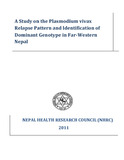Please use this identifier to cite or link to this item:
https://hdl.handle.net/20.500.14356/303Full metadata record
| DC Field | Value | Language |
|---|---|---|
| dc.contributor.author | Nepal Health Research Council (NHRC) | - |
| dc.date.accessioned | 2012-12-29T06:12:41Z | - |
| dc.date.accessioned | 2022-11-08T10:14:17Z | - |
| dc.date.available | 2012-12-29T06:12:41Z | - |
| dc.date.available | 2022-11-08T10:14:17Z | - |
| dc.date.issued | 2011 | - |
| dc.identifier.uri | http://103.69.126.140:8080/handle/20.500.14356/303 | - |
| dc.description.abstract | Altogether, six health centers were chosen from the Kailali and Kanchanpur district; three from each district. The respective health centers were selected on the basis of maximum number of malaria positive cases reported preceding year. The study tried to find out the relapse pattern of P. vivax for the period of six months from December 2010 to May 2011. In total, 137 malarial blood samples were accessed from the four health centers. Two health centers from Kanchanpur district were excluded due to unavailability of malaria positive cases during the study period. Age-group 21- 30 years had the highest distribution with 34 percent participation. Twenty nine percent and 17 percent of the patient belonged to the age-group 10 to 20 and 31 to 40 years respectively. Only 4 percent cases were observed in the age group 60 above years. In our study, 81 percent were male and 19 percent were female. Out of total malaria blood samples, 23 cases (17%) were relapsed during six months period. Random Fragment Length Polymorphism (RFLP) is a method used in distinguishing between selected genotypes within a species. RFLP was carried out on 100 P. vivax species identified in Nepali malarial cases. The study looked into distinguishing two major genotypes of P. vivax- namely VK210 and VK247 within the P. vivax species which have been identified in South Asian cases, especially in neighboring India. Results of 100 samples showed a net success rate in positive identification of 84% samples whereby all the isolates were found to be VK210 genotype. This is a preliminary baseline genotyping study targeting only known gene sequences pertaining to the genotypes. A thorough genome sequencing of all strains in this study would provide detailed genetic variation data amongst these and other isolates. | en_US |
| dc.language.iso | en_US | en_US |
| dc.subject | Dominant Genotype | en_US |
| dc.title | A Study on the Plasmodium vivax Relapse Pattern and Identification of Dominant Genotype in Far-Western Nepal | en_US |
| dc.type | Technical Report | en_US |
| Appears in Collections: | NHRC Research Report | |
Items in DSpace are protected by copyright, with all rights reserved, unless otherwise indicated.

